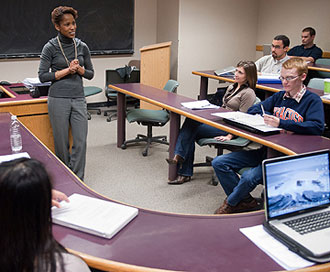Maxwell Perspective: Different (But Related)
July 7, 2012
From Maxwell Perspective...
Different (But Related)
Responding to trends in the world and in the workplace, Maxwell forges stronger ties between public administration and international relations.

Shena Ashley, assistant professor of public administration, teaches a version of “stats” tailored to IR concerns
Last year, Shena Ashley taught a “stats” class populated by both public administration and international relations students. She discovered she could easily tell them apart. PA students engaged quantitative skills without hesitation, trusting that these concepts serve one’s imminent readiness for the world of public management. IR students are more “qualitative,” more “analysis-focused,” according to Ashley. They envision a fascinating, borderless world in which they will soon serve higher ideals. The notion that “stats” is a prerequisite takes a little convincing.
So this spring Maxwell began offering a second “stats” class, tailored to IR majors. “We cover all the same concepts,” says Ashley, an assistant professor in PA. “But all the applied cases come from the IR world.” This approach helps demonstrate that the course is relevant (to students whose hopes and dreams are defined by relevance).
There is a “classic” PA student and a “classic” IR student, and their differences mirror the degrees. “IR students want to operate on an international scale. They think outside an organization,” Ashley says. “PA people think about organization. ‘How are we going to implement this?’”Ashley is glad Maxwell is home to both because, alone, neither perspective quite cuts it anymore.
What is PA? What is IR? How are they different? How are they similar? Such questions were on everyone’s mind this academic year, when committees, task forces, and forums were convened to explore whether the two programs share enough in mission and pedagogy that they might be stronger if “merged.”
In the end, yes, there will be a “merger.” The new Department of Public Administration and International Affairs (PAIA) arrives on July 1, housed in an enlarged, renovated suite. However, the only things being truly “merged” are support functions — some to be consolidated; others (such as student recruitment), better coordinated. The degree programs themselves — the MPA and the MA(IR) — continue. They will be offered by this new, “merged” department, but each will retain its distinct character.
“The key,” says Interim Dean Michael Wasylenko, “is that the degrees will now operate under common leadership. We have long asked PA and IR to explore synergies, to build upon mutual concerns. Bringing the two degrees under one roof will accelerate that process.” Future curriculum refinements, faculty hirings, teaching assignments — all will be enhanced, Wasylenko says, by a more expansive sense that the two programs, though different, share a lot.
“In faculty retreat after faculty retreat, one of our priorities has been the internationalization of PA.”
-John McPeak, associate professor of public administration
The fields of public administration and international relations have been evolving toward each other a long time. Many MPA graduates now head for jobs in internationally focused organizations. Even those in local government find “internationalization” all around them. As one student told us, “I don’t think you can get a job anymore without some global perspective.”
“In faculty retreat after faculty retreat, one of our priorities has been the internationalization of PA,” says PA faculty member John McPeak, hired in 2002 because his own research (livestock development in Africa) is international.
Not only are more of the jobs “internationalized,” but there is a new sense of how change happens, pioneered by NGOs. “We need to get beyond government as the main body of authority,” says David Van Slyke, associate professor of public administration. “Governments are learning to work with nonprofits and a whole range of international actors.” He says one of the key challenges in PA education is to get students thinking that way.
The evolution of the IR degree, meanwhile, roughly parallels career trends. Over a decade or so, there has been an explosion of management opportunities in economic development, humanitarian services, diplomacy, and the like. Born as a scholarly emphasis within political science, Maxwell’s IR program began changing in the 1990s, adding a required international internship to make the degree a little more “practical.” Since then, IR has replaced its scholarly thesis with a simulation on international negotiation, adopted more PA-taught skills classes, and replaced a core qualitative analysis course with policy implementation and evaluation.
The stickiest question became how to “professionalize” IR without sacrificing the program’s widely lauded multidisciplinarity and its distinctive options in such areas as conflict resolution and global civil society. Although few of Maxwell’s IR graduates later earn a doctorate, the theoretical heart of the program is considered vital. “We are challenged,” says Wasylenko, “to augment IR without squeezing out its long-held values.”
Among current students, those in the joint PA/IR program perhaps best appreciate the “synergies.” Caroline Neilsen, for example, was a veteran of the Peace Corps and the nonprofit Freedom House who had grown “passionate about nonprofit management” but needed the “opportunity to develop hard skills.” At Maxwell, she’s gaining public-management skills and studying good governance. “For development to work in any part of the world, you need good governance,” she says.
Sarah Yagoda — who worked at the Carter Center, Accion USA, and World Teach — arrived at Maxwell understanding, in a general sense, she needed theory and skills. “The program evaluation course — I didn’t even realize I needed that until I took it,” she says.
Patrick Gaetjens, another PA/IR student, was convinced by Peace Corps and USAID contractor experience that he needed more education, and came to Maxwell for skills and concepts. He calls the creation of PAIA “a no-brainer.” Pointing to the economic recession, for example, he says, “there are so many linkages between the United States and the rest of the world.”